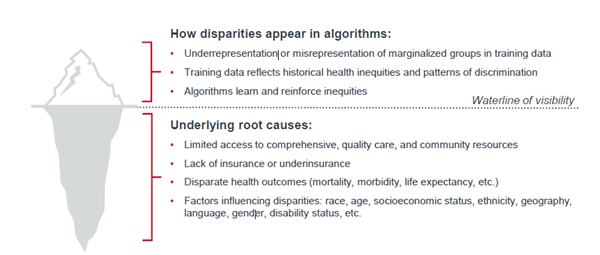Artificial Intelligence (AI) has emerged as a transformative force in healthcare, promising improved diagnostics, personalized treatment plans, and enhanced patient care. However, the integration of AI in healthcare is not without its challenges.

The Advisory Board has revealed five significant hurdles that the healthcare industry must overcome to fully harness the potential of AI.
1. Data Bias:
One of the primary challenges in implementing AI in healthcare is the presence of data bias. AI algorithms learn from historical data, and if that data is biased, the AI system can perpetuate and even exacerbate existing disparities. For instance, if a dataset used to train an AI model is skewed towards a particular demographic, the system may struggle to provide accurate and fair predictions for individuals outside that group. Addressing data bias requires a concerted effort to diversify and balance training datasets, ensuring that AI systems are trained on representative data from various populations.

2. Data Accuracy and Reliability:
The effectiveness of AI in healthcare hinges on the accuracy and reliability of the data it processes. Inaccurate or incomplete data can lead to incorrect diagnoses and treatment recommendations, potentially putting patients at risk. Ensuring the quality of input data is a critical challenge, as healthcare systems often grapple with incomplete electronic health records, variations in data formats, and discrepancies in data entry. To tackle this challenge, healthcare providers must invest in robust data quality assurance measures and establish standards for data interoperability.
3. Data Sharing:
The seamless exchange of healthcare data among different entities, such as hospitals, clinics, and research institutions, is essential for the success of AI applications in healthcare. However, concerns about patient privacy and data security, along with regulatory compliance, create barriers to effective data sharing. Striking the right balance between data accessibility and protecting patient privacy is a delicate challenge that requires the development of secure data-sharing frameworks, adherence to robust encryption standards, and compliance with evolving data protection regulations.
4. Transparency:
AI algorithms often function as "black boxes," making it challenging for healthcare professionals and patients to understand how decisions are reached. This lack of transparency and explainability is a significant hurdle, especially in healthcare, where decisions can have life-altering consequences. To build trust in AI systems, it is crucial to develop models that provide clear explanations of their reasoning. Researchers and developers must prioritize creating interpretable AI models that foster transparency in decision-making processes while empowering healthcare professionals to understand and trust the recommendations provided by AI.
5. Liability:
As AI becomes more integrated into healthcare, questions surrounding liability and accountability arise. Determining who is responsible for errors or adverse outcomes resulting from AI decisions is a complex challenge. The current legal framework may not be fully equipped to handle the intricacies of AI-related liabilities. Healthcare providers, AI developers, and regulatory bodies must collaborate to establish clear guidelines and frameworks for liability in the context of AI applications. This includes defining the responsibilities of each party involved and establishing protocols for addressing and learning from AI-related incidents.
While the integration of AI in healthcare holds immense promise, addressing these challenges is crucial for realizing the full potential of these technologies. By prioritizing data fairness, accuracy, sharing, transparency, and liability, the healthcare industry can pave the way for a future where AI plays a central role in improving patient outcomes, enhancing clinical decision-making, and revolutionizing the delivery of healthcare services.
Are you eager to stay ahead of the curve in your industry? Sign up for our monthly insights email and gain exclusive access to valuable market research, industry trends, and actionable recommendations delivered directly to your inbox.
Topics from this blog: Healthcare